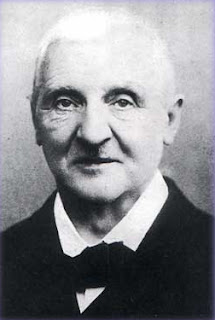Bruckner circa 1890
Last night at the Sage, Gateshead, those few of us who turned out were lucky to hear an excellent performance of Bruckner's 8th Symphony in C Minor.The orchestra was the CBSO.The conductor, as stand-in at short notice for Andris Nelsons was Simone Young.This proved to be an inspired choice.To complicate the matter further and reflect the specialism of the conductor the edition used was the 1887 version rather than the more usual 1890 version.All the more credit to the orchestra for rising to the occasion.There was an introductory talk by Stephen Johnson and the event was recorded by the BBC for future transmission.The work was billed as "Bruckner's apocalyptic" which is a catchpenny title if ever there was one-and inappropriate into the bargain.The hall was at best no more than a quarter full.Those who were present enjoyed a memorable evening.
I must admit that my heart sank a little when when Stephen Johnson announced that we would be hearing the earlier version of the symphony; but then I had never listened to it before. It turned out to be a notably different piece with many beautiful moments not found in the later version.
To take only the first movement;in terms of dramatic interest the revised 1890 ending seems all the better for being quiet-from fortissimo in the original to pianissimo in 1890.The 1887 ending is a spectacular Brucknerian climax and few, maybe no composers have written more gloriously for the brass section, but enough is enough- in the right place.When Bruckner revised it he was only doing what all creative people sometimes have to do-cut good things in the interest of the work as a whole. Schalk was later to say that,
"The first movement now ends pianissimo as we all wished it would."(Howie page 611.)Who are "all" in this context one wonders?
The 1890 version seems superior in terms of emotional drama, coherence and the implacable power and unity of the finale.But having said that, I will certainly be looking out for Ms Young's recordings of the original versions.But I do not think it fair to say that the 1887 version is "the masterpiece".
I am compelled to think nevertheless that Hermann Levi was right to express his concerns about the 1887 version and Stephen Johnson inevitably recalled the well known story of Bruckner's devastation on learning that his "artistic father" (actually 15 years younger) had doubts about the original score. Levi's tact and consideration-not to mention consternation in responding to the work reflect his understanding of the man he was dealing with.He wrote firstly to Schalk,in a letter dated 30/09/87, before responding to Bruckner, about his own first studies of the symphony.
"I am afraid he will be totally crushed by this disapointment."
Levi saw,
"...great similarity with the Seventh and an almost stereotyped form. The beginning of the first movement is splendid but I don't know where to start with the development section. And the entire final movement-it is a closed book to me." (Howie,page 554.)
Levi's concerns about Bruckner's feelings were were well founded. To the composer he wrote the following in his letter of 7/10/87.
"The themes are marvellous and magnificent, but their working-out seems dubious and, in my opinion, the instrumentation is impossible." (Howie,pages 554/555)
The expected reaction did follow and it was Schalk who replied to Levi about Bruckner's reaction:
"...he is upset, in despair and no longer able to believe in himself. Meanwhile his colossal natural strength,both physical and moral, will soon help him to recover." (Howie, page 556)
Later in October 1887 Bruckner is quoted as saying that, "Levi he's a knave. It's hard for him to grasp things you know." (Korstvedt,19)
Bruckner did indeed soon recover his mental balance, and quite quickly began to revise the work. Even a great creative spirit such as he can sometime benefit from the advice of junior figures.
To say that Ms Young threw herself into the music would be an understatement and no one could say that the beat she gave was unclear. In general I thought the performance was fairly incandescent and the orchestra as a whole on very good form.The almost barbaric splendour of the finale was amply demonstrated.
At the actual Vienna premiere of the symphony on December 18, 1892, there was a greater demand for standing room tickets than for any other performance that season.(Kvorstedt,4 ) One likes to think that perhaps the young were rallying to the Bruckner cause.
PS I see that another reviewer was impressed by this performance.You can read John Leeman here,
At the actual Vienna premiere of the symphony on December 18, 1892, there was a greater demand for standing room tickets than for any other performance that season.(Kvorstedt,4 ) One likes to think that perhaps the young were rallying to the Bruckner cause.
PS I see that another reviewer was impressed by this performance.You can read John Leeman here,
Anton Bruckner: A Documentary Biography:Vol II, Trial and Tribulation in Vienna,by Crawford Howie.2002.
Bruckner Symphony No 8: Benjamin M Kvorstedt,2000
Bruckner Symphony No 8: Benjamin M Kvorstedt,2000

No comments:
Post a Comment